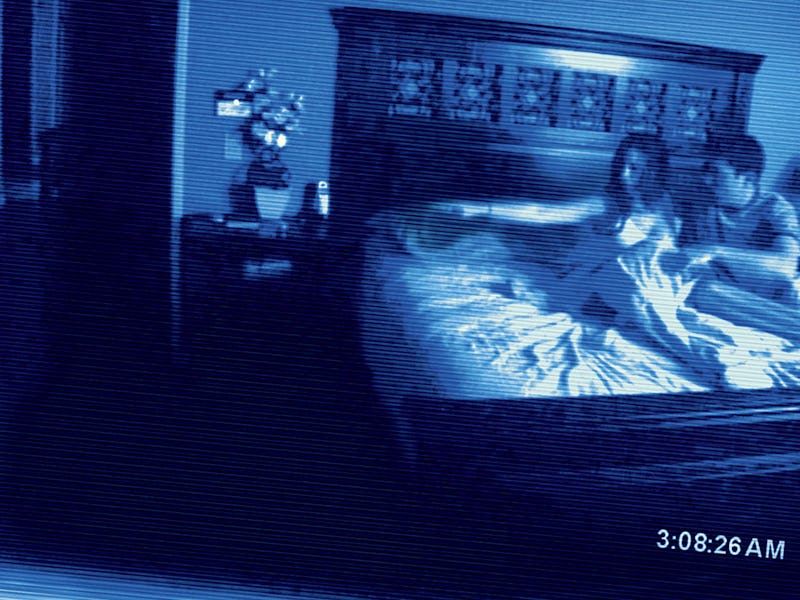How The Scariest Movie of 2009 Launched an Unstoppable Hollywood Studio
“I wanted to make it look as real and natural as possible.”

You kind of had to be there.
Paranormal Activity, like The Blair Witch Project before it, is a movie best experienced in a large dark room with 100 screaming strangers. Maybe that’s true of most movies, but found-footage thrillers attempt to hijack your brain into thinking they’re real in a way that just doesn’t work when you’re watching it at home when the lights are on and phone notifications are vying for your attention.
But even if you can’t re-experience the original sensation of seeing Paranormal Activity in theaters when it was released back on September 25, 2009, it’s still worth reflecting on how this micro-budget horror movie managed to become a worldwide phenomenon, and how it changed the entire industry in the process.
The plot is simple. A young couple, Katie and Micah, move in together. Katie then tells Micah that she’s been haunted by an evil spirit ever since she was a kid, so Micah sets up a camera and records everything in the house, including their bedroom, while they sleep. The haunting starts small (a door moves on its own, there are some light noises), but things escalate within a few weeks, leading to a terrifying finale where Katie becomes possessed by a demon and murders Micah.
Paranormal Activity was made with just $15,000 and filmed in one week in first-time director Oren Peli’s own home. Peli cast two unknown actors, shot the movie on a home video camera, and never bothered writing a script; like with The Blair Witch Project, actors were told to improvise based on a loose outline.
Katie Featherston as Katie.
In a 2009 interview with Shock Till You Drop, Peli explained his lo-fi, found-footage approach.
“I wanted to make it look as real and natural as possible,” he said. “I’ve always been drawn to this storytelling style. It breaks the mental barrier when audiences see a regular film and become aware of the camera movements, they know a crew is there and there are stars. When you strip all of this away, the audience thinks they are seeing something with a higher degree of plausibility. The suspending of disbelief becomes all the easier. You have an audience that's more invested in the story and the characters.”
Paranormal Activity made almost $200 million at the box office and spawned a seven-movie franchise, but its legacy is even bigger than that. Peli’s thriller also gave rise to one of the biggest names in horror today: Jason Blum.
Jason Blum attends the Film Independent's Spirit Awards in 2010.
After debuting at Screamfest in 2007, Paranormal Activity earned some Hollywood buzz. It landed on the desk of Blumhouse CEO Jason Blum, then an executive at Miramax, who worked with Peli to edit the movie and submit it to Sundance. They were rejected, but didn’t give up, and eventually, an early copy of Paranormal Activity found its way to Steven Spielberg.
Spielberg made a deal with Peli and Blum to release the movie through Paramount. The plan was to completely reshoot it with a bigger budget while releasing the original cut as a DVD extra, but after a test screening scared audiences so much that some people walked out, the team realized they had a potential hit on their hands. The rest is history.
Sinister followed a similar formula, giving director Scott Derrickson the freedom to experiment.
Speaking to The LA Times just days before Paranormal Activity finally hit theaters, Jason Blum broke down exactly what makes the movie so special. “Once every five years, a guy makes a movie for a nickel that can cross over to a broad audience," he said.
You could practically hear the gears turning in Blum’s head. While his studio, Blumhouse, had already existed for a few years, it was Paranormal Activity that cracked the code. Movies like Insidious and Sinister would soon follow, giving ambitious directors little money but lots of freedom to make bold horror movies that could rake in millions and launch new franchises.
In that sense, we have Paranormal Activity to thank for our current glut of horror movies. Blumhouse is still pumping them out 15 years later, and so is everyone else, from indie studios like A24 to Hollywood titans like Paramount. Even Disney is cashing in on horror thanks to its Fox acquisition and the IP, like Alien, that came with it.
But while Paranormal Activity’s legacy may be mighty, the movie itself hasn’t exactly held up, at least not in the context that most people experience movies these days.
“You watch it in your bedroom, it can look like your kid made it,” Blum said back in 2009. “You watch it with an audience, it's an entirely different experience.”
So if you want to watch Paranormal Activity the way it was meant to be seen, just get 100 of your closest friends and family together in a dark room. If that’s not viable, you can explore the entire genre it spawned instead.